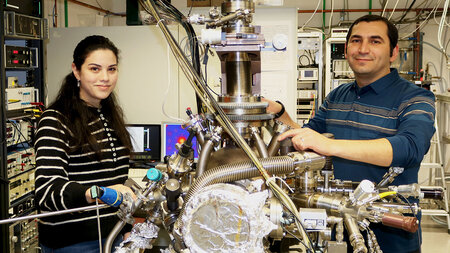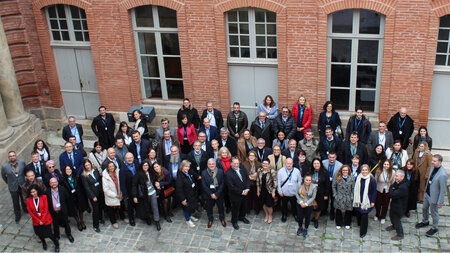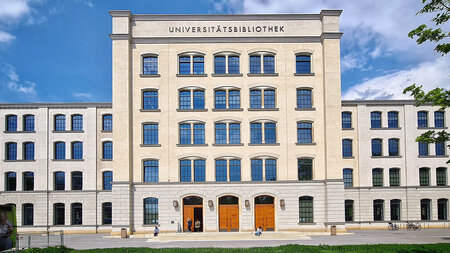Interface Existence between Physics and Psychology
Eleven questions for Prof. Dr. Wolfgang Einhäuser-Treyer, Professor of Physics of Cognitive Processes since April 2015
-

Prof. Dr. Wolfgang Einhäuser-Treyer researches questions regarding visual perception, visual awareness and the interconnection of perception with action and decision-making processes. For this, eye-tracking systems are a central methodology, with which eye movements can be measured. Photo: Steve Conrad
Prof. Dr. Wolfgang Einhäuser-Treyer (37) has held the Professorship for Physics of Cognitive Processes since April 2015. In eleven responses he gives the readers of “University News“ an insight into his professional background, scientific objectives and activities in Chemnitz.
What is actually meant by “Physics of Cognitive Processes”?
The naming of the professorship is probably unique in the world, but in my opinion, beautifully expresses its existence at the interface between Physics and Psychology. Specifically, we try to make human sensory and cognitive processes accessible by physical methods. That sounds very modern, but stands in a long tradition of so-called Psychophysics. Even before Fechner coined this term, perception research was conducted by scholars like Maxwell and von Helmholtz who are also known to us for their contributions to Physics.
The TU Chemnitz is the right choice for me as a professor, because…
…the link between Physics and Psychology is seriously lived here and institutionalized in the study program of Sensors and Cognitive Psychology.
Can you say a few words about your academic career so far?
I studied Physics in Heidelberg and Zurich, obtained my PhD in Neuroinformatics from the Swiss Federal Institute of Technology (ETH) Zurich, then spent almost two post-doctoral years at the California Institute of Technology (Caltech), worked about a year at ETH’s Computer Science department and finally seven years as an assistant professor of Neurophysics in Marburg. In-between I spent a year at the Center for Interdisciplinary Research (ZiF) in Bielefeld.
Describe your years of study in only a few words.
Thanks to my stays abroad and change of the study place, I won new perspectives and motivation.
Did you have role models during your studies who encouraged you to pursue a scientific career?
Certainly my doctoral supervisor and the directors of our Institute during my doctorate period. Despite their considerable administrative duties, they have never lost the joy of daily work in the laboratory, and they also managed to transfer this enthusiasm to us as their students. I came to properly appreciate this only later in my career, when realizing that it is anything but self-evident.
Do you have any advice for young students and graduates?
Enthusiasm for the subject and its topics is definitely more important than looking at the supposed significance or at the prospects for future career choices. Within a period of studies those can change anyway.
What would you like to achieve in your teachings in the future?
The link between Physics and Psychology should become even closer in the study program of Sensors and Cognitive Psychology and become evident already at the level of individual lectures and seminars. In the midterm, I hope that the Master’s degree program receives more inflow from outside the TU Chemnitz and establishes itself among the leading cognitive-science programs in Germany and Europe.
What impact does your research have at the TU Chemnitz?
In addition to continuing my work on eye movements under realistic conditions and on multi-stable perception, the affiliation with the Institute of Physics offers an opportunity to significantly expand theoretical aspects of my work and also push forward more applied ideas. In addition, I look forward to collaborating with the Cognitive Systems Lab to bring together visual and auditory perception towards a comprehensive understanding of multi-modal perceptual and cognitive processes. Finally, I see many possible points of contact with colleagues from other institutes such as Human Movement Sciences or Computer Science.
There are around 45,000 professors at German universities. What distinguishes you from all others?
Perhaps influenced by my international experience, I do not regard disciplinary boundaries to be of any significance and firmly believe in the concept of interdisciplinarity; unfortunately, this term has recently been overused.
What is your favorite place to show guests in Chemnitz?
To my guests with children I show the zoo in Rabenstein, otherwise the Karl Marx Monument is obviously very impressive.
How do you play a part in the life of the city?
In the few months that I have been in Chemnitz so far, there is obviously little institutionalized interaction with life in the city; but it seems to me that daily interaction is the most important anyway. On a professional level, I want – together with my colleagues - to further increase the interaction with the local schools at all levels, to foster the enthusiasm for science in general and for our specialization already at an early stage.
Further information about the professorship at: https://www.tu-chemnitz.de/physik/PHKP/
(Translation: Nataliia Boiko)
Katharina Thehos
16.09.2015





